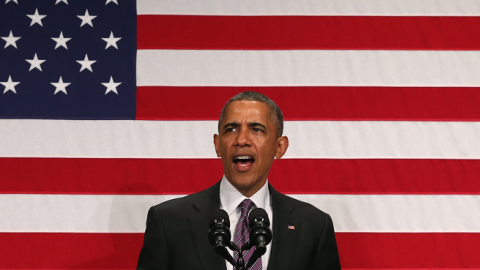It is mandatory for economists to point out that one data point does not make a trend. We then all-too-often fill space with, er, a discussion of one data point, most usually the monthly report on job creation. Not being one to defy convention, I will report that Friday's jobs report was a yawner. The 217,000 new jobs created in May finally pushed total jobs above pre-recession levels, but the unemployment and labor force participation rates remained unchanged at 6.3 percent and 62.8 percent, respectively. No post-winter jobs growth spurt, at least not yet, but no reversal of recent growth either.
Enough about this one data point. The more important question is when will job-creation accelerate sufficiently to induce those who have dropped out of the labor market to re-enter, and provide what policymakers here have come to call "good-paying middle-class jobs." Which in turn depends on when the various engines of economic growth will rev up sufficiently to overcome the braking power of mistaken economic policy.
Fortunately for the American economy and job-seekers, several engines of growth are already or about to replace the slower-growing but still healthy housing market; the collapsing market for legal and banking services (declines perhaps should be classified as removal of an impediment to growth); and the drag created by stagnation in France, Germany, and other parts of euroland, and in China, which is struggling to balance its need to clean up bank balance sheets and wind down inefficient state-owned enterprises, while preventing a slowdown sufficient to create a challenge to the stability of the communist political system.
Most important of the sputtering growth engines is trade, the freeing up of which President Obama promised would open export markets for hosts of American manufacturers and farmers.
As we say in New York, fuggedaboutit. Imports were up, and exports were down in April for the fourth time in five months, meaning that much American spending on gadgets and machinery went to foreign firms and workers. Any hope that freer trade deals will reverse that trend is fast fading. For several reasons:
* Domestic support for freer trade is evaporating as the belief grows that it does wonders for corporate profits, stashed overseas, at the expense of working men and women who watch their jobs vanish to Asia, Central America and Mexico. Trade unions have warned that in this congressional election year they will exact a price from any member that supports the trade agenda of the president they helped to elect. No surprise, then, that Senate majority leader Harry Reid has told the president that he will not even put freer trade to a vote, much less support a bill consenting to any free-trade treaty.
* Protectionist unions have allies in some board rooms. Makers of solar panels have persuaded the Department of Commerce to assess tariffs of up to 35 percent on imports of an expanded range of solar products from China.
* The boost provided to American exports by the Federal Reserve Board's policy of printing money to drive down the dollar is being offset, at least in part, by the European Central Bank's new policy of attempting to drive the euro down, and China's on-going efforts to manipulate the yen so that its exporters have an unwarranted advantage in competition with our manufacturers.
Meanwhile, the president's two ambitious free-trade agreements, the Transatlantic Trade and Investment Partnership (TTIP) and the Trans-Pacific Partnership (TTP) are at least in serious trouble, or more likely quite beyond revival.
TTIP RIP.
* France is insisting on protecting its farmers from the more efficient American agribusinesses, and BNP Paribus, its biggest bank, from the $10 billion fine US prosecutors have in mind for breaking sanctions on Iran, Sudan and Cuba. Foreign Minister Laurent Fabius says, "This ... [Trans-Atlantic Trade and Investment Partnership] can only be established on the basis of reciprocity.... One cannot imagine that reciprocity can be the rule if at the same time there is a decision of this type." In short, no trade deal unless France's banks are allowed to operate in the America outside of the law.
* The success of anti-establishment, anti-freer trade parties in recent EU elections won't make it easier for centrist parties to push through new trade deals.
* Meanwhile, environmental and trade union groups here fear that Obama's proposed trade deal with the EU will be a back-door to the relaxation of regulations covering environmental, labor, and health and safety standards.
TPP RIP. The president's plans for a massive and complicated trade deal (Trans-Pacific Partnership) with several Asia-Pacific countries, a deal that the Peterson Institute of International Economics could produce a $78 billion income gain for the U.S., is also stalled. It is foundering on the reef of the president's falling prestige in the region. Vladimir Putin's massive gas deal with China proves to be a pivot far more awe-inspiring than Obama's stationing of a few thousand troops in Australia. And the president's red-line erasures in Crimea and Syria are rattling our allies and trading partners as China becomes more aggressive in the South China Sea.
Enough of the stalled engines of growth, some of which might, but only might, emerge from the repair shop after the November elections. Other engines of growth are already revving up.
The first of these is the fracking revolution. America is now the home of well-priced, abundant energy, attractive to manufacturing industries around the world. The Wall Street Journal's Dennis Berman reports that Sasol, the former South African state oil company, is building a $21 billion, 3,034-acre energy complex to convert natural gas to chemicals used in food packaging, plastics and paints, and into high-quality diesel and other fuels. That, he reports, is only the beginning: some 66 industrial projects are scheduled to be built in Louisiana at the cost of $90 billion over the next five years-with more to come. "But because much of the work hasn't started yet, few appreciate the true extent of the industrialization that is about to begin."
It is a bit premature to announce what some call the re-industrialization of America, but it isn't too soon to announce the end of de-industrialization. The manufacturing sector has added over 100,000 jobs in the past year. An enviable supply of well-priced natural gas-only one-fourth the price paid by German industry-is only one American advantage. In addition, labor costs here are increasingly competitive with China's, which are rising rapidly. Boston Consulting Group estimates that China's overall manufacturing-cost advantage over the U.S. now stands at only 4 percent. Even if that understates the advantages China's subsidized manufacturers enjoy in industries that the People's Republic chooses to groom for international stardom, corporate decision-makers here also have to factor in closeness to customers in this age of rapid shifts in technology and fashion, and security of the intellectual property that China is said-and not only by American firms-to appropriate without hesitation. Then there is the rule of law, which all studies show is one of the keys to long-run success.
Throw in the American edge in innovation, and the continued robust performance of the auto industry, and the outlook seems bright. Unless...
The administration, having taken care of the coal industry and planning to attend its funeral dry-eyed, now has fracking fracking in its sights, and is not ignoring the significant pollutants emitted by the tax-advantaged Sasol and like projects. And it remains fond of higher taxes, such as the twenty-one raised or imposed in the so-called Affordable Care Act, better known as Obamacare.
Sand in the engines of growth, just when many economists are cutting their forecasts of growth this year from 4 percent to 3 percent. The rush to revision demonstrates the (appropriate) lack of faith intelligent forecasters have in their ability to play seer. If their rush to downward revision proves unwarranted, that will be despite, rather than because of, anything Washington has in store for the economy.
















